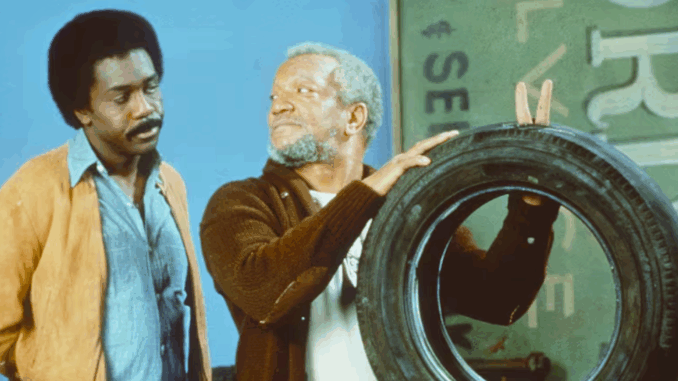
On screen, Sanford and Son was a comedic masterpiece: Fred Sanford’s grumbling sarcasm, Lamont’s exasperation, and their junkyard adventures kept millions tuning in every week. But behind the scenes, the laughter was often accompanied by conflict, disappointment, and behind-the-curtain drama that few viewers ever saw.
Much of the tension stemmed from Redd Foxx himself. Brilliant, volatile, and fiercely independent, Foxx was not your typical sitcom star. He pushed NBC to hire more Black crew members, including director Stan Lathan and numerous writers, at a time when diversity in production was almost nonexistent. But he also walked off the set during contract disputes, missed filming days, and was not shy about airing his frustrations.
In 1974, Foxx left Sanford and Son mid-season after a dispute over salary and contract terms. For several episodes, the show ran without Fred Sanford altogether. NBC eventually reached an agreement, and Foxx returned—but the rift was evident.

Demond Wilson, who played Lamont, had his own grievances. Though he never left the show, he reportedly felt underappreciated and underpaid compared to his co-star. In interviews years later, Wilson expressed frustration that his contributions were overlooked and that he was never offered the same opportunities as Foxx after the series ended.
Despite these struggles, the two actors shared a kind of magic onscreen. Their banter was believable. Their tension—real or performed—fueled the comedy. It’s often said that the best art comes from conflict, and Sanford and Son might be proof of that. The friction between Fred and Lamont mirrored the real-world dynamics of race, class, and generational divides in 1970s America.
In 1977, the show ended, not with a grand finale, but a quiet fade-out. There were follow-up attempts: a short-lived series called Sanford and spin-offs like Grady and The Sanford Arms, but none matched the original’s magic.
Today, fans look back on Sanford and Son with nostalgia—but the show was more than its catchphrases and laugh tracks. It was built on battles, backstage and on-camera. And perhaps that’s what made it so unforgettable: the comedy was real, but so were the complications.